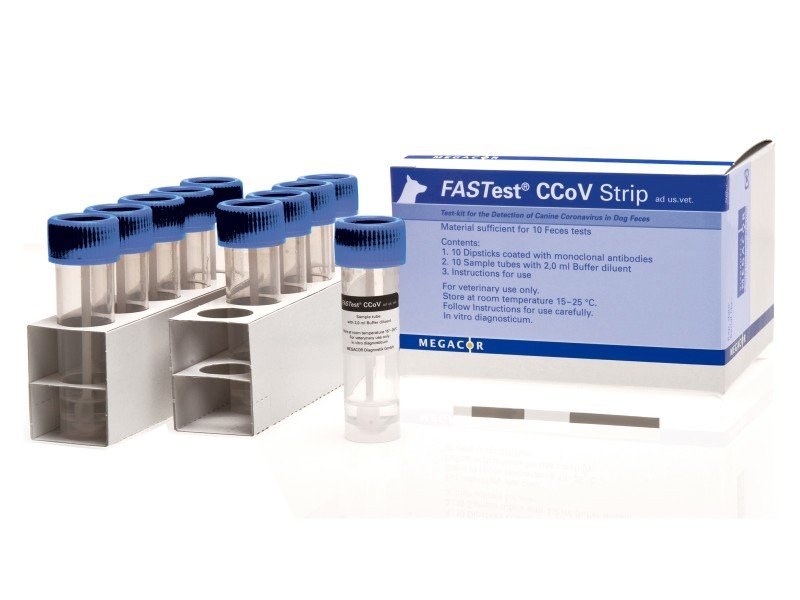Description
Qualitative Detection Of Canine Coronavirus
Test applicable to: Dog
Sample: Faeces
FASTest Canine Coronavirus (CCoV) Strip is a rapid immunochromatographic test for the detection of Canine Coronavirus Antigen in dog faeces. FASTest Canine Coronavirus (CCoV) detects antigens in canine faeces simply and quickly in the clinic.
Fast Aetiological Diagnostics
Using the FASTest CCoV Strip test kit enables the veterinarian to determine the specific agent responsible for the diarrhoea and estimate the prognosis for a single CCoV or a simultaneous infection with CPV and CCoV and to distinguish between CCoV infected and non-infected puppies in kennels.
FASTest CCoV Product Information – PDF Download
It is an invaluable diagnostic tool when used with FASTest Parvo (and possibly FASTest Giardia) when presented with a young dog with suspicious clinical signs.
You may also be interested in FASTest CPV Ab, follow this link
You may also be interested in the FASTest GIARDIA strip, follow this link
You may also be interested in the FASTest PARVO card, follow this link
Why Test?
Why is it important to test for Canine Coronavirus?
Canine Coronavirus causes sporadic outbreaks of mild (often self-limiting) to severe enteritis and is known as the second most common etiologic agent of canine viral enteritis next to Canine Parvovirus. Dogs of all ages but especially puppies and dogs in kennels are susceptible to CCoV. CCoV is difficult to clinically differentiate from mild causes of CPV or other enteric diseases as clinical signs are similar.
Although Canine Coronavirus is less severe than distemper or parvovirus, it is important to get dogs tested for this disease. It is a highly contagious intestinal disease which can infect dogs worldwide. The way it is transmitted is normally faeces to oral, which means any uninfected dog can become infected by licking, eating or drinking the infected dog’s faeces or contaminated water. Canine Coronavirus can also strike at the same time as Canine Parvovirus and this will then result in the illness becoming more deadly compared to the dog contracting the viruses individually.
Not every dog will become infected and this can be influenced by several factors including:
- The overall health of the dog
- The dog’s immune system
- Environmental factors including stress, dry or cold weather
- The dog’s vaccination history
- The Virulence of the virus
If all of the above is taken into consideration is it possible that the dog will not become infected and develops the disease but there is a chance of a dog which is exposed to a combination of various conditions becoming susceptible to the disease?
Symptoms
What are the symptoms of Canine Coronavirus?
Clinical signs are depression, fever, anorexia, vomiting and diarrhoea and can vary in severity from mild, or even undetectable, to fatal. Puppies are most susceptible and can often be infected with Canine Parvovirus as well as Canine Coronavirus when clinical signs can be very severe and mortality rates exceed 80%.
The incubation period for the disease is a short one and the vomiting and diarrhoea stage of the illness can appear within 1 – 3 days of the dog’s exposure to the disease.
Although there is no cure for Canine Coronavirus, an infected dog will need sufficient supportive treatment to usually make a complete recovery. The sick dog will need to be placed in a warm and comfortable environment and regularly monitored as they can suffer from dehydration.
Instructions For Use
Instructions For Use
FASTest CCoV Strip Instructions For Use


